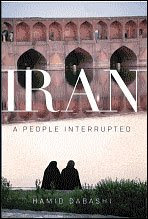Iran, a People Interrupted

This book was incredibly refreshing, but almost in spite of itself. Take passages like this "The so-called U.S. war on terrorism is being used to cover up a far more dangerous reality: a systematic mystification of world politics in violent theological terms- corroborated as much by the reciprocal atrocities of Osama bin Laden's "Islam" and George W. Bush's "crusade"..." That passage already seems delightfully dated! They're not even calling it a war on terror anymore. In my (and probably yours if you're reading this) ivory tower, looking down at the little anthills of populism, there is a collective sigh of relief as the decade of 'jesus camp' and burkas fades into memory. Like leg-warmers and micheal Jackson in the 80's, the tacky aesthetization of politics seemed to be going out of style. Hell, with all this recession mumbo-jumbo, we might even be getting back some of the more meaty political categories, although I won't hold my breath.
This book is a little histrionic, Dabashi using his little anti-colonial/said-ian bag of tricks ad nauseum, even using exact phrases every dozen pages or so, and what starts off as a promising iranian history from below devolves into a few unrigorous attempts at idealizing iranian cosmopolitanism as compared to the modern-traditional binary. I actually bought Shari'ati's "Civilization and modernity" in Turkish the other day (this place is abound in second hand bookstores with strangely high-brow titles, I've bought Jean Cocteau, Ernesto LaClau, and almost bought a falling-apart premchand paperback) and will be delighted to fall back into that binary for old time's sake.
Dabashi's 'less accessible' stuff, like his excellent theology of discontent, is very rigorous and scholarly, so I was suprised at how pop-politics this book was. Like he was trying to get sophomore college kids who had just come off a chomsky binge. Maybe he was hoping to get the even more vulnerable audience, like those first-timers to the middle east history section of barnes and nobles, who are choosing between him and Bernard Lewis. you know, trying to not be out-dumbed, to use the famous Bush phrase, by Lewis. For that I guess I'll forgive him.
My favorite part is when he delves into his seeming vast knowledge of literature (as any good columbia professor would). He includes a list of books banned by the Pahlavies "list-e kutub e-zalleh)(لستي كتب الضالة) " list of books that will misguide you. He also name drops lots and lots of famous Iranian authors, poets, filmmakers and activists. I have since been trying to find work by some of these names, especially the stuff from the Qajar era. I will be sure to find some useful and esoteric quotes from poems in the near future.
But, that being said, I must be careful not to go to far and learn farsi, heaven forbid. I'll stick with flirtations like Ghalib(Urdu) and Nedim (Ottoman Turkish).
(speaking of, look at this little gem from Nedim about my current address)
- بو شهر ستنبول كه بىمشل و بهادر
- بر سنگکه يكپاره عجم ملک فداءدر
- Bu şehr-i Sıtanbûl ki bî-misl-ü behâdır
- Bir sengine yekpâre Acem mülkü fedâdır[1]
geleceğı şüphesiz - his coming is indubitable
şüphesiz ki gelecek - it is indubitable that he will come
The Turkish grammar book I got that from has this little tid-bit sentance afterwards, just to be snide.
İslamiyetin kabuliyledir ki, Türk dili üzerine bir taraftan Arapça, öbür taraftan Farsça etki yapmaya başlamıştır
It is with the acceptance of Islam that Arabic on one hand, Persian on the other, began to exercise influence on the Turkish language.'
The best part is how ademently any turk I've talked to denies any such influence. " well, (yani (يعني)), some words (kaleme (كلمة)) maybe have come from arabic, god (allah (الله) for example (masele(مثلا)), but not many are still found (mavcud) (موجود)".
Anywayssssssssssssssss, the book is fine, a nice light read if you're nostalgic for the Bush years.

Comments